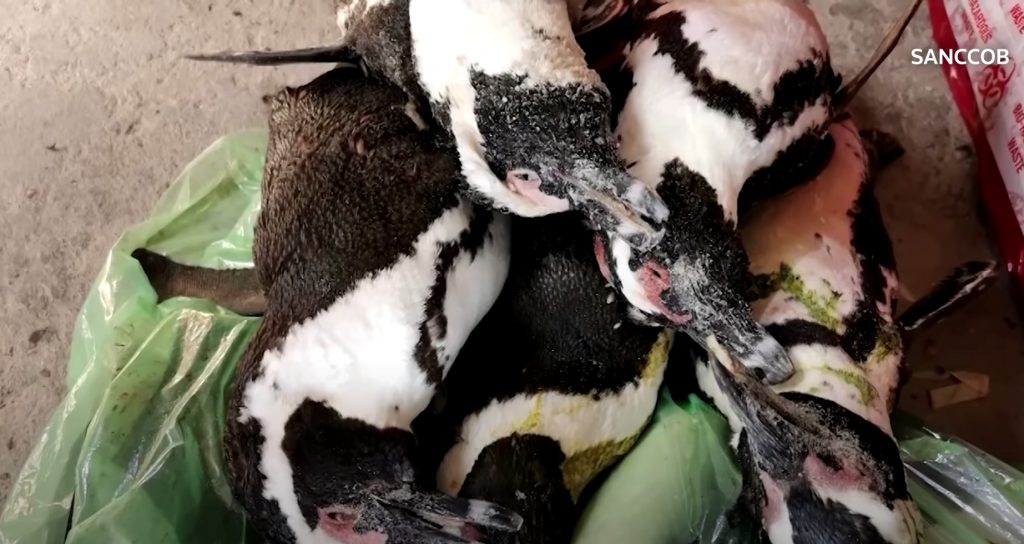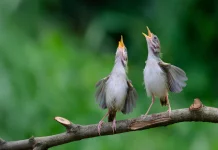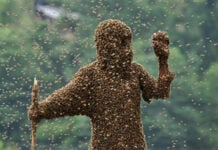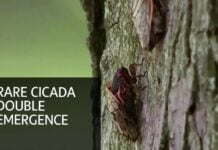
Dozens of endangered African penguins were apparently killed by a swarm of bees in South Africa on Friday.
The 63 penguins were found dead on Friday at a colony in Simonstown, near Cape Town, according to a statement from South African National Parks (SANParks).
“The deaths occurred suddenly some time between Thursday afternoon and Friday morning,” and experts started investigating the cause of death, the statement said.
“The post-mortems revealed that all the penguins had multiple bee stings, and many dead bees were found at the site where the birds had died,” it added.
The preliminary investigation suggested the penguins died after being stung by Cape honey bees, SANParks said, but samples were still being tested to rule out other possible causes.
Alison Kock, a SANParks marine biologist, thanked the organization’s partners, including the Southern African Foundation for the Conservation of Coastal Birds (SANCCOB) and the City of Cape Town, for their assistance in investigating the “unusual event.”
“No more dead African penguins were found on site today, and we will continue to monitor the situation,” Kock said in the statement.
On Sunday, veterinarian David Roberts from SANCCOB told the AFP news agency that bee stings had been found around the penguins’ eyes.
“This is a very rare occurrence. We do not expect it to happen often, it’s a fluke,” Roberts told AFP.
African penguins are native to the coasts of South Africa and Namibia.
They are among the smaller penguin species, known for their irregular markings and loud voices.
The species is also in sharp decline, from a population of more than a million at the beginning of the 20th century to just 55,000 in 2010 – when they were declared endangered. [CTV News]
Sometimes, animals show more empathy and even rescue to each others…
Now subscribe to this blog to get more amazing news curated just for you right in your inbox on a daily basis (here an example of our new newsletter).
You can also follow us on Facebook and/ or Twitter. And, by the way you can also make a donation through Paypal. Thank you!
You should really subscribe to QFiles. You will get very interesting information about strange events around the world.














Unbeelievable. I can not believe anyone would believe this obviously bs scientific explanation. First, If bees stung and killed penguins, it would have happened before. Penguin mass murder by bees has never happened before. Second, the penguins would have obvious circular welts and massive inflammation around the eyes with actual stingers left in the wounds (because bees leave their stingers in the victims wounds). Third, if the queen stung one of the penguins it would focus on that specific one and not 63 individual birds. Fourth, some of the penguins should have survived, and stings would have been found on them. Fifth, why the eyes? It is not as if the penguins are armor plated and the only spot to sting them is the eyes. It is much more likely that something killed the penguins and the bees at the same time. An example of a possible culprit is a sound weapon. This would have killed both species. In Indonesia, many birds have been dying. This is another example of a possible sound weapon. Even massive electromagnetic disturbance could have done this in both of these cases. But the bees story killing these penguins seems like they didn’t even try to fool you morons.
https://duckduckgo.com/?q=Melbourne+earthquake&t=h_&ia=web
Hey Manuel,
Earthquake Melbourne Australia.
https://www.naturalnews.com/2021-09-21-covid-vaccines-pregnant-women-nejm-correction-evidence.html
Vax and spontaneous abortion:
Gen0cide/infanticide feeds molech?
GMO bees?
Maybe.
Poor penguins.
We have Africanized bees here. They do get very pissed off. We have had cases where people die. I walked by a new hive once, and they started chasing. I ran inside. They were much more aggressive than standard honey bees. I’m not allergic, but if 50 sting you, it could cause anaphylactic shock.
Too bad for those penguins. ?
https://www.thegatewaypundit.com/2021/09/pelosi-says-150000-americans-received-covid-vaccine-breaks-mask-mandate-video/
May 150,000 unvaxxed killer bees sting this cucking funt.
Amen
Some of those sørøs human bioweapons decided to hijack a bus, and injured border patrol down in Texas.
???????F biden & The vice prostitute.
No border, no country.